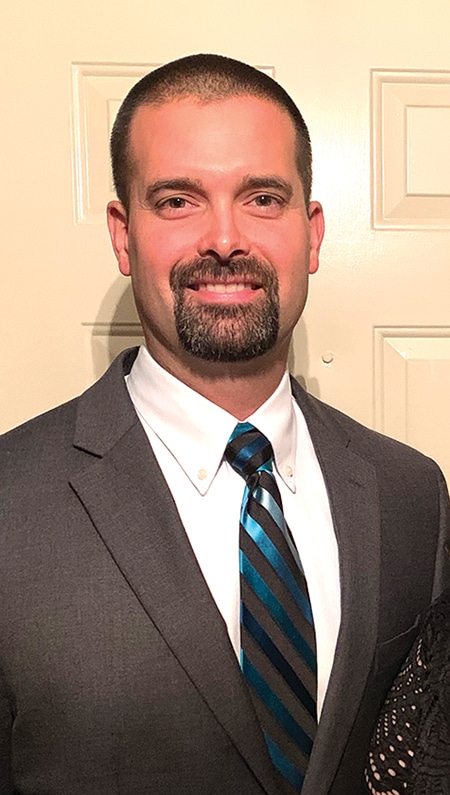Brian Cook
Can the faith of others have a direct effect on ours? Not indirect like encouragement, but direct as in efficacious. I answer with a resounding “Yes!”
As a Protestant, I looked upon faith as something you either had or did not have. It was either on or off, and once it was “switched on” by God, it could never be “turned off” by anyone or anything.
As a Catholic, however, I look at faith as something that is much more “living and active.” It most definitely is a gift from God (Ephesians 2:8) and, like any relationship, can be formed and developed as well as weakened and hindered. I see that the things I do, as well as the things I avoid, will either strengthen faith, like testing metal or refining gold, or chop away at it like felling a tree.
In Mark 2:1-12, we see the healing of the paralytic, a wonderful and memorable story that makes it into all the movies about Jesus. I especially love how the story is presented in “The Chosen,” and I hope you watch that series as well. Mark Chapter 1 sets up the scene. Jesus is baptized and takes over the Gospel messaging. He then is tempted in the desert, passing the test that Adam failed.
Being tested and strengthened in the desert (Hebrews 5:8), Jesus begins His ministry in Galilee, calls disciples, and starts profound-ly exercising His power and authority in Capernaum by casting out evil spirits and healing all manner of diseases. He then embarks on an early morning trip back to the desert to pray.
We come to chapter 2 of Mark. The crowds in Capernaum had swelled to overflow in every way. Friends crowded in to hear Jesus’ words. Those in need pressed in for possible healing. Foes set traps. Onlookers watched for The Show that they had been hearing about. But the needs of one would not have been met if not for the decisive action of others on their behalf. Being that “the one” al-ways matters to Jesus, He leaves the 99 to find him (Luke 15:4). And this one, with the greatest need calling for the greatest miracle, was about to be presented in dramatic fashion.
There is no record of the paralytic saying a word, praying or asking for anything out loud. I’m sure his heart was crying out. What we do see, however, is the action of others on behalf of the paralytic. With great determination, four men carry their friend to the roof of the house where Jesus was, peel back the roof and settle the man’s pallet down right in front of Jesus. We then read a most amaz-ing verse: “And when Jesus saw their faith, He said to the paralytic, ‘My son, your sins are forgiven’” (verse 5).” Jesus heard their prayer and saw their faith.
But who’s faith was it?
We are familiar with James 2:26, in which we read that “faith without works is dead.” This verse clearly teaches that faith is not something we think; rather faith is something we do (Ephesians 2:10). Thus, we are judged by our works of faith (Matthew 25:31-46). Faith is not something we muster up, but a gift from God that is to be cooperated with and exercised or else it is wasted and taken away (Matthew 25:14-30). Faith and works are never an “either/or” but rather a “both/and.”
Have you ever thought about your faith on behalf of others? These men acted out their faith on behalf of another, and Jesus saw it and responded. Jesus always responds to faith, and our gracious God went straight to the deepest need, so much further that the re-quest that was being made. He skipped the temporal need and healed the eternal one to show everyone that God has come to forgive sins, our deepest need, that the temporal need was met.
What I hope you see is that our faith can be effective for others (James 5:16). This is why we are encouraged to bring infants for baptism (Acts 2:38-39), to bless one another in our home (1 Corinthians:7:14) and to interceded in prayer for one another (Ephesians 16:18).
Our faith in action is so desperately needed by those around us. True faith changes everything and changes everyone.
Brian Cook is a Cropwell native and a graduate of Pell City High School, Gadsden State Community College and studied music and history at Jacksonville State. He and his wife Hope have five children. A self-described “on-again-off-again bi-vocational part-time” Protestant minister for almost 20 years, Brian converted to Catholicism in April 2021. They attend Saint James Catholic Church in Gadsden. With no formal training (Acts 4:13), Brian is active in the Catechetical training of children and adults. His book “The Devotion to Christ” can be found on Amazon. He is available for speaking and teaching engagements in any parish, church, or group setting. He may be contacted at thedtc@protonmail.com or thedevotiontochrist@gmail.com.




